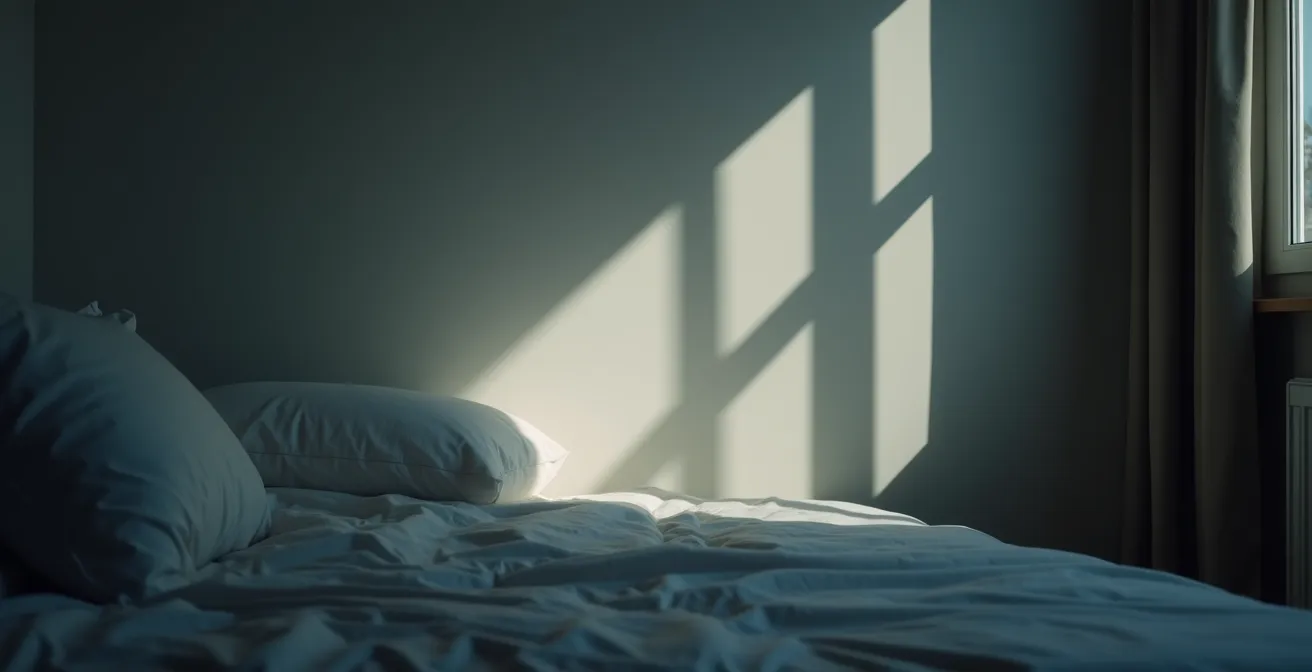The narrative around women’s sleep is often simplified to a single word: “stress.” While true, this explanation barely scratches the surface, ignoring a more complex and systemic reality. The exhaustion many women feel is not a personal failing but the result of a collision between societal expectations and their unique biological blueprint. From the invisible weight of emotional labor to the cyclical shifts in hormones, the factors robbing women of restorative rest are deeply embedded in their daily lives.
Understanding this intricate connection is the first step toward reclaiming nights of deep, uninterrupted slumber. A proactive strategy involves not only managing daily pressures but also supporting the body’s natural sleep processes. For many, this can include targeted nutritional approaches, such as incorporating effective supplements for sleep, designed to work with female physiology rather than against it.
The Path to Women’s Restorative Sleep
- Uncover how societal roles and “time poverty” directly disrupt women’s sleep patterns.
- Understand the profound impact of hormonal fluctuations on sleep quality throughout life.
- Learn to identify the root causes of sleep issues, from lifestyle to biology.
- Explore targeted supplement strategies to support deep and restorative rest.
Decoding the sleep crisis: Beyond stress, how society shapes women’s rest
The modern world’s “always-on” culture disproportionately affects women, who often juggle professional responsibilities with the deeply ingrained expectations of caregiving and household management. This creates a state of chronic hyper-arousal, where the mind refuses to switch off. The result is a significant sleep disparity, with studies showing 38% of women reporting fewer nights of quality sleep compared to men. This isn’t just about feeling tired; it’s a systemic issue with profound consequences.
Chronic poor sleep impacts our relationships, workplace productivity, and increases the risk of cognitive decline, mood disorders, and serious health conditions.
– Dr. Nunez, ResMed Global Sleep Study, 2025
This challenge is compounded by “time poverty”—the objective lack of free hours in the day—which forces women to sacrifice sleep for other duties. The cumulative effect of the mental load and daily stress creates a significant barrier to establishing healthy sleep hygiene. A proactive sleep strategy, therefore, must begin with acknowledging and mitigating these external pressures.
Building resilience requires a conscious effort to set boundaries and re-prioritize rest. This involves more than just a relaxing bedtime routine; it means actively dismantling the societal expectations that treat sleep as a luxury rather than a biological necessity.
Proactive Steps to Build Sleep Resilience Against Societal Stress
- Recognize and challenge cultural norms de-prioritizing women’s sleep.
- Adopt time management techniques to mitigate ‘time poverty’.
- Incorporate relaxation rituals to counteract emotional labor.
- Seek social and professional support for caregiving responsibilities.
The female sleep blueprint: Hormonal harmony and the pursuit of deeper rest
Beyond societal factors, a woman’s sleep is profoundly influenced by her ever-changing hormonal landscape. The intricate dance between estrogen, progesterone, cortisol, and melatonin dictates sleep architecture—the very structure of a night’s rest. From the monthly menstrual cycle to the transformative stages of pregnancy, perimenopause, and menopause, these fluctuations can directly disrupt the ability to fall and stay asleep.
What is restorative sleep?
Restorative sleep refers to the deeper stages of sleep, like slow-wave and REM sleep, where the body and brain perform crucial repair, memory consolidation, and hormonal regulation. It’s about sleep quality, not just quantity.
Progesterone, for instance, has a sedative-like effect that promotes deep, slow-wave sleep, while estrogen helps stabilize REM sleep and maintain a balanced body temperature. When these hormone levels drop, as they do before a period or during menopause, sleep becomes lighter and more fragmented. This biological predisposition explains why so many women experience sleep disturbances, with data indicating that 44% of menopausal women report difficulty falling asleep frequently.
Hormonal fluctuations and sleep disturbances across the menstrual cycle and menopause
A study highlights how progesterone and estrogen fluctuations during the menstrual cycle and menopause significantly affect sleep quality. Progesterone enhances slow-wave sleep, and estrogen stabilizes REM sleep. A decline in these hormones during menopause increases the time it takes to fall asleep and reduces the amount of deep sleep achieved. You can read the study here: Frontiers in Sleep Research, 2023.
The following image captures the intricate, layered nature of our biological systems, representing the hormonal complexity that governs so much of a woman’s well-being, including her ability to rest.
Achieving hormonal harmony is therefore central to unlocking deeper rest. The goal isn’t just to fall asleep faster but to ensure the time spent sleeping is genuinely restorative, allowing the body to complete its essential nightly maintenance.
Progesterone has hypnotic and sedative properties influencing sleep depth, while estrogen modulates REM sleep stability.
– ML Andersen et al., Frontiers in Sleep Research, 2023
Breaking the cycle: Identifying and addressing the root causes of women’s sleep woes
Poor sleep and hormonal imbalance often create a debilitating vicious cycle: a lack of restorative rest elevates stress hormones like cortisol, which in turn further disrupts sleep and hormonal balance. Breaking this pattern requires moving beyond basic sleep hygiene to identify the specific triggers, whether they are rooted in lifestyle, physiology, or both.
As research from W. Zeng et al. in the Journal of Menopausal Health highlights, sleep issues during menopause are linked not only to hormonal shifts but also to increased psychological stress and occupational pressures. The interconnectedness of mental and physical health is key; anxiety, depression, and physical discomforts like restless leg syndrome can transform the bed from a sanctuary into a source of stress.
This abstract image of a dimly lit space conveys the feeling of restlessness and unease that can pervade the night, turning what should be a peaceful time into a period of anxious waiting.

This is where the concept of “sleep self-advocacy” becomes crucial. It empowers women to become active participants in their health by tracking symptoms, understanding their bodies, and seeking informed medical or lifestyle interventions. It’s about asking the right questions and demanding better answers than “you’re just stressed.” You can [Discover another hidden societal pressure] that shapes women’s health experiences.
Framework for self-advocacy and informed action on sleep health
- Track lifestyle factors and their impact on sleep patterns.
- Identify symptoms suggestive of hormonal or physiological causes.
- Consult healthcare providers for personalized diagnosis and treatment.
- Incorporate mental health support addressing anxiety and depression.
Key takeaways
- Women’s sleep issues are a complex mix of societal pressures and unique hormonal fluctuations.
- Hormones like estrogen and progesterone play a direct role in regulating deep and REM sleep stages.
- “Sleep self-advocacy” empowers women to identify root causes and seek appropriate, personalized interventions.
- Targeted supplements can support the body’s natural sleep mechanisms when used as part of a holistic strategy.
Targeted nutritional support: Supplement strategies for restorative sleep
When lifestyle adjustments and stress management aren’t enough, targeted nutritional support can be a powerful ally in the pursuit of restorative sleep. The right supplements work by supporting the body’s natural sleep-regulating pathways, from calming the nervous system to balancing circadian rhythms. Rather than simply inducing drowsiness, they aim to improve the overall quality and architecture of sleep.
For example, certain herbs have been studied for their calming effects. One study noted valerian root improving sleep quality in menopause, showing significant subjective improvement after 30 days of use. Different supplements target different challenges, and understanding their mechanisms is key to choosing the right one.
This table provides a breakdown of common supplements, their mechanisms of action, and the specific sleep issues they are best suited to address, helping to guide a more informed approach to nutritional support.
| Supplement | Mechanism of Action | Targeted Sleep Issue | Recommended Hormonal Phase |
|---|---|---|---|
| Melatonin | Circadian rhythm regulation | Difficult falling asleep | All phases |
| Valerian Root | GABA modulation, sedative effect | Sleep latency, anxiety | Menopause, perimenopause |
| Magnesium | Muscle relaxation, neurotransmitter support | Frequent awakenings, restless legs | All phases |
| L-theanine | Promotes relaxation, reduces stress | Sleep quality | All phases |
However, it is crucial to approach supplementation as part of a comprehensive wellness strategy. Diet, exercise, and mental health support are foundational pillars of good sleep. Supplements are meant to augment these efforts, not replace them.
Guidelines for Supplement Consultation and Usage
- Consult a healthcare professional before starting supplements.
- Consider interactions with medications and personal health conditions.
- Use supplements as part of a broader lifestyle and dietary approach.
- Monitor effects and adjust usage under professional guidance.
Frequently Asked Questions on Women’s Restorative Sleep
Why is sleep different for women?
Women’s sleep is uniquely influenced by a combination of factors. Hormonal fluctuations throughout the menstrual cycle, pregnancy, and menopause directly affect sleep architecture. Additionally, societal roles often lead to higher levels of stress, emotional labor, and “time poverty,” which create significant barriers to achieving consistent, high-quality rest.
Can supplements alone fix my sleep problems?
Supplements can be a very effective tool, but they work best as part of a holistic approach. They are designed to support your body’s natural sleep processes, not override underlying issues. For optimal results, combine them with good sleep hygiene, stress management techniques, a balanced diet, and regular physical activity.
When should I see a doctor about my sleep?
If your sleep problems persist for more than a few weeks, significantly impact your daily life, or are accompanied by other symptoms like severe snoring, gasping for air, or mood changes, it’s important to consult a healthcare professional. They can help rule out underlying medical conditions and recommend a personalized treatment plan.
What’s the difference between falling asleep and getting restorative sleep?
Falling asleep is simply the transition from wakefulness to sleep. Restorative sleep refers to the quality of that sleep, specifically the time spent in deep (slow-wave) and REM sleep stages. It’s during these stages that your body performs critical functions like tissue repair, memory consolidation, and hormonal regulation. You can get eight hours of sleep but still wake up tired if it’s not restorative.

